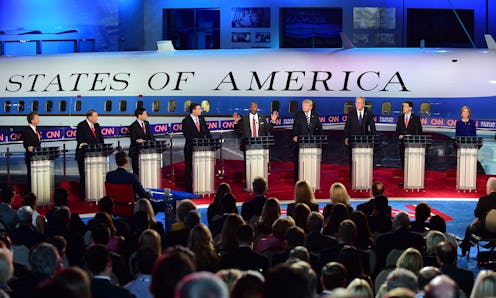News
Who Will Be At The Next GOP Debate?
The next Republican debate is rapidly approaching, and finally, the lineup is confirmed. That wasn’t the case in the weeks prior; due to a number of factors, it wasn’t clear for some time who would be partaking in the forum, which will be broadcast live from CNBC on October 28. But barring anything drastic, we now know with certainty which candidates will be at the next GOP debate.
As with the last two go-arounds, the unwieldy number of Republican candidates means there will be two debates. The “kid’s table” pre-show debate will feature Rick Santorum, Bobby Jindal, Lindsey Graham, and George Pataki, while the real debate — sorry, “primetime” debate — will have Donald Trump, Ben Carson, Marco Rubio, Carly Fiorina, Mike Huckabee, Chris Christie, Rand Paul, Ted Cruz, John Kasich, and I-can't-believe-I'm-still-typing-names Jeb Bush on the stage.
You may notice some names missing from that list. Scott Walker participated in the first two main stage debates, and for a while, he was considered a shoo-in for the nomination. Since then, however, he’s dropped out of the race, embarrassing some pundits in the process. The undercard debate, meanwhile, will be missing one Jim Gilmore — yes, he’s a presidential candidate — as he failed to qualify for both debates under CNBC’s guidelines.
For a while, some of the other candidates looked to be in trouble as well. In order to participate in the primetime debate, candidates must have an average of 3 percent in polls taken over the last five weeks. Christie, Kasich, and Paul were dangerously close to dipping below that, but they ultimately prevailed. The same was true of Graham, who very nearly didn’t achieve the 1 percent in support required to make the undercard debate. But the last three polls put him over the edge.
There was another factor contributing to the uncertainty of the debate lineup. Two factors, actually: Trump and Carson. Both had threatened to boycott the debate on account of CNBC’s proposed rules, which would have had the debate run two hours plus commercials and prohibited the candidates from giving opening and closing statements. Trump and Carson, the two frontrunners in the polls, cosigned a letter demanding that the forum be shortened, so it ran two hours including commercials, and that all of the candidates be permitted to give opening and closing statements.
In a development that surprised nobody, CNBC folded the next day and changed the debate rules. Because let’s face it: A Republican debate without Donald Trump is a much less enjoyable Republican debate.
